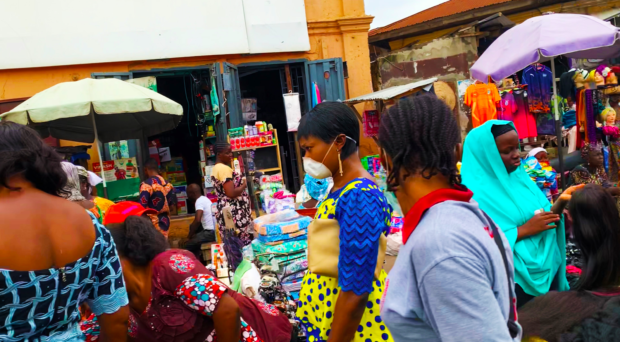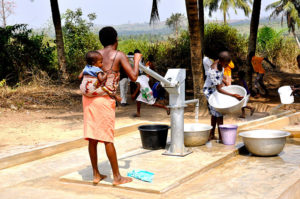
For my master’s degree in cell biology and genetics, I screened for gene polymorphisms in adults co-infected with helminth and latent tuberculosis in a rural community in Nigeria’s south west region. The journey from my university (the University of Ibadan) to the study site took several hours and along the way, I began to ask myself why my supervisor, Dr Chiaka I. Anumudu, was attracted to the particular study site.
The days that we spent at the site were quite eye opening for me as I found myself in Eggua village, a peaceful community which, I found out, largely relies on the Yewa river for daily life.
I did not grow up very rich but no matter how much I thought we lacked, my family never had to bathe, drink or wash using water from a river that some people do urinate and defecate near resulting in haematuria and other symptoms of schistosomiasis. Even though we were providing praziquantel for those that had the disease, I knew that it may not stop future episodes of the disease as the people will still go back to the river which is the main source of infection.

On our last day at the village, a PhD grad student that is also a member of the research team took me round the village. We saw huts, farmlands and buildings inhabited by individuals of all age groups. Then we proceeded to the river because he needed the coordinates for his thesis. Out of my curiosity and probably naivety, I asked aloud why will people be drinking or doing anything in the water – the popular Yewa River? A villager passing by heard and smiled. He boasted that at birth, he was bathed with the water from the river and he continues to drink it to this day.
Almost every household in the community, including the king’s, has had at least one person that suffered from schistosomiasis, making it a perfect study site for studies focusing on schistosomiasis.
But I began to ask myself what direct benefit will the man that has been drinking the water from birth enjoy from my work that is on gene polymorphism? I also asked myself whether my line of research would result in any direct benefit to the community.
Mainstreaming molluscicide-like studies
A quicker solution to the schistosomiasis crisis in the community would be the provision of safer and cleaner sources of water. Even though I overheard my supervisor talking about plans to get the community the much needed assistance from government and other parties to achieve this, she was quick to tell me that it is not researchers’ job to be providing water to communities.
“But what about making the water safer and unable to allow vectors of schistosomiasis to thrive?” I responded.
She drew my attention to the world of molluscicide. While reading up this particular line of research, I noticed that the idea has been floating around since the 1950s, or probably much earlier.
Walter L. Newton and Willard T. Haskins in July 1953 described the dosage-mortality responses of some strains of Australorbis Glabratus to sodium pentachlorophenate.
In fact the World Health Organization (WHO) recommends that snail control be implemented as a key

component of any schistosomiasis control and elimination strategy. Currently the WHO has licenced only one molluscide compound for the control of snails in areas affected by schistosomiasis, called Niclosamide.The WHO has developed guidelines on the evaluation of molluscicides and a manual for the field application of molluscicide. However it is known that the application of Niclosamide may not be appropriate or feasible for all transmission settings, though safe for humans and mammals, it is known to be toxic to other aquatic animals such as fish and ampibians. It also biodegrades rapidly meaning it can not be applied to large expanses of water, such as big lakes. Whilst snail control is a key component for schistomiasis elimination, further reseach and development is needed to produce low-cost, suitable and effective snail control and transmission control strategies.
For example a 2018 review mentioned Euphorbia milii var. hislopii, described by Eugene Ursch and Jacques Désiré Leandri in 1955, as “the most promising” phytochemical molluscide for use in official schistosomiasis control programs.
Considering the few number of scientific publications on molluscicides since 2018, it may take several years or decades before an effective molluscicide will emerge and may still take more years for such to become available to the people of Eggua village and others around the world that are still dealing with schistosomiasis.
A wide-reaching problem
This is not something that is peculiar to schistosomiasis as it seems like the situation is the same for several other parasitic diseases. While the body of knowledge on various parasites, vectors and associated diseases are expanding at a very rapid rate, many of the diseases continue to kill more people.

Few weeks ago, I visited one of Africa’s highly respected experts in virology, Prof Oyewale Tomori, and he drew my attention to how science is getting sidelined in the scheme of things and the general public, especially in several low and middle-income countries are struggling to understand the importance and relevance of the science ecosystem.
He noted that even though lots of research papers are published annually on malaria resulting in the emergence of several professors of malaria, their findings are yet to transform into the end of malaria as most of the successes recorded in malaria control are attributed to expanding access to antimalarial drugs and insecticide-treated nets and not local malaria researches. Little or nothing from the local research ecosystem has significantly changed or helped the malaria response.
COVID-19’s reset button
As COVID-19 continues to be the center of attention as far as science is concerned and researchers working on the disease are publishing their research at a faster rate than for other diseases, I believe that it should serve as a key moment for researchers in the parasite and vector-borne diseases community to think of reevaluating their research priorities and consider not just how their science will provide additional knowledge regarding their research interest, but will also provide direct and quick benefit to the people that are living with the disease that we are researching.
Tens of thousands of people, largely young children, die annually of malaria. They will not benefit directly from research exploring the genome of the malaria parasite or its vector, while indirect impact might take decades – if there will be any at all.
I know that it is not every researcher that can focus on solutions but I believe that the community needs to be frank with itself and find out how solutions-focused research can be better prioritised because no matter how much attention that COVID-19 is getting, malaria and other disease burdens remain, so do the whole spectrum of vector-borne parasitic diseases.
The villager that overheard me thinking aloud regarding the awful state of the water that he and other members of Eggua community rely on may not understand what single nucleotide polymorphisms mean and may get bored just listening to me explain. But I believe he and other residents will be excited to know about a molluscicide that will ensure that the Yewa River no longer harbors any vector of the parasitic infection that has plagued their community for decades.

Simply put, even when the attention of the global science community is on demystifying COVID-19, societies that are directly benefiting from our research will still be interested in the science that affects their daily lives and could be active advocates for such research even when government policies and priorities fluctuate and change. As a global health research community, is it time for us to rethink how we involve societies in our research, so that together we can find practical solutions aimed at improving their lives?

Comments